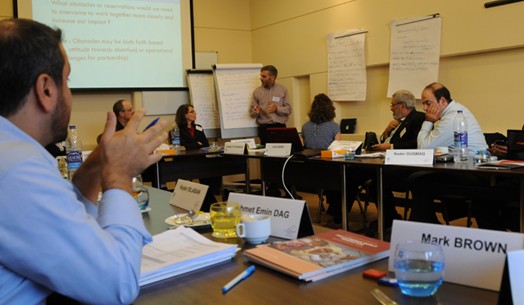
The workshop Working Together: Christian-Muslim Humanitarian Partnerships, co-hosted and jointly planned by The Humanitarian Forum and The Lutheran World Federation (LWF) Department for World Service, took place in Amman, Jordan, from 5 to 8 October 2013.
The purpose of this workshop was to discuss operational issues around interfaith humanitarian partnerships. It complements the United Nations High Commissioner for Refugees (UNHCR) Dialogue on Faith and Protection, held in December 2012, and the follow-up statement “Welcoming the Stranger: Affirmations for Faith Leaders.”
Alongwith IHH, there were representatives of different humanitarian and faith-based organizations at conference.
The 25 workshop participants included representatives from the UN, Islamic and Christian non-governmental organizations and international platforms; UNHCR; UN Office for the Coordination of Humanitarian Affairs (OCHA); The Humanitarian Forum (Headquarters and local forums in Egypt and Indonesia); Human Appeal International; IHH Humanitarian Relief Foundation; Islamic Relief Worldwide (Headquarters and Jordan Office); Jordan Hashemite Charity Organization (JHCO); Muslim Aid (Jordan Office); LWF (Headquarters and offices in Jerusalem, Jordan, Kenya and Myanmar); Center for Disaster Risk Management and Community Development Studies (CDRM & CDS), Nommensen University, Indonesia; Rangpur Dinajpur Rural Service (RDRS) Bangladesh; ACT Alliance (Action by Churches Together); and Muslim Charities Forum.
“Partnership becomes a compelling duty on all of us, no one organization can work alone,” noted Dr Hany El Banna, President of The Humanitarian Forum. “We shouldn’t be afraid of building partnerships; fear is a mirage not a reality.”
Participants committed themselves to practical cooperation in assistance to refugees, displaced populations and their host communities in Jordan, Kenya, Somalia and Myanmar.
“This workshop confirmed that we all have much in common and want to work together,” concluded Rev. Eberhard Hitzler, director of the LWF Department for World Service. “We strongly believe that closer cooperation at local and global levels can be of mutual benefit and, most importantly, can contribute to improving our humanitarian services for people affected by disasters.”